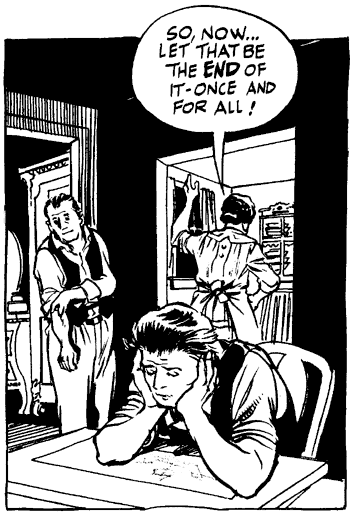Will Eisner died on Monday.

There’s no way I can describe my admiration for Eisner’s cartooning. (If some genie appeared and offered to give me Eisner’s drawing skills in exchange for my legs, I wouldn’t even hesitate.) The best Eisner pages are simply perfect in every respect – the flowing, innovative, pitch-perfect layouts, the sure-handed anatomy, a surface loose and cartoony enough to keep things lively, and an exquisite brush line that only Walt Kelly ever did better.
Probably Eisner’ll be best-remembered for his pre-WW2 Spirit comics. That’s understandable. The Spirit was a great comic book, with a sense of design that remains stunning six decades later.
But for me the semi-autobiographical comics Eisner created in the 80s and 90s – about being young and Jewish and talented in the shadow of anti-Semitism and a gathering world war – are the peak of Eisner’s long career. Eisner’s cartooning was better in his 70s than in his 20s – looser, shorter brushstrokes, characters with lumpy bodies and faces like people I’ve known my whole life, and layouts too self-assured to bother being flashy. And Eisner’s later writing was both more ambitious and more human than the Spirit ever attempted. He did, as Kip said, have a tendency towards “shopworn stories” (and — let’s face it — a bit of a tin ear for dialog) but autobiography — and a real kindness towards his characters — helped him overcome that.
I took a cartooning class from Will at The School of Visual Arts. He was funny and sharp and overly kind with grades and not particularly interested in the comics we students produced (and who could blame him?). Most of the students had no idea they were being taught by a legend. He wasn’t a great teacher; the few students who cared had to work to engage his interest, draw out his insights, pestering him into talking shop. But holy fuck, it was worth it.
At the time, I knew enough to admire Eisner’s cartooning greatly but also thought his attitudes towards cartooning and storytelling were dated (and didn’t hesitate to tell Will so). In the years since, I’ve come to appreciate the lessons he taught – and his amazing kindness in putting up with argument after argument from a brash, ignorant kid like me. Will was too secure with his creative voice to bother keeping up with changing fashions, and his creative vision was firmly rooted in the 30s and 40s. But he knew the foundations of good visual storytelling like no cartoonist ever born, and that never gets outdated.
Kip has thoughts (“I’m smart enough not to write him off as a triumph of technique over substance, but even if I weren’t: my God , what technique”) and a lot of good links.



Pingback: Hereville — Eisner and me